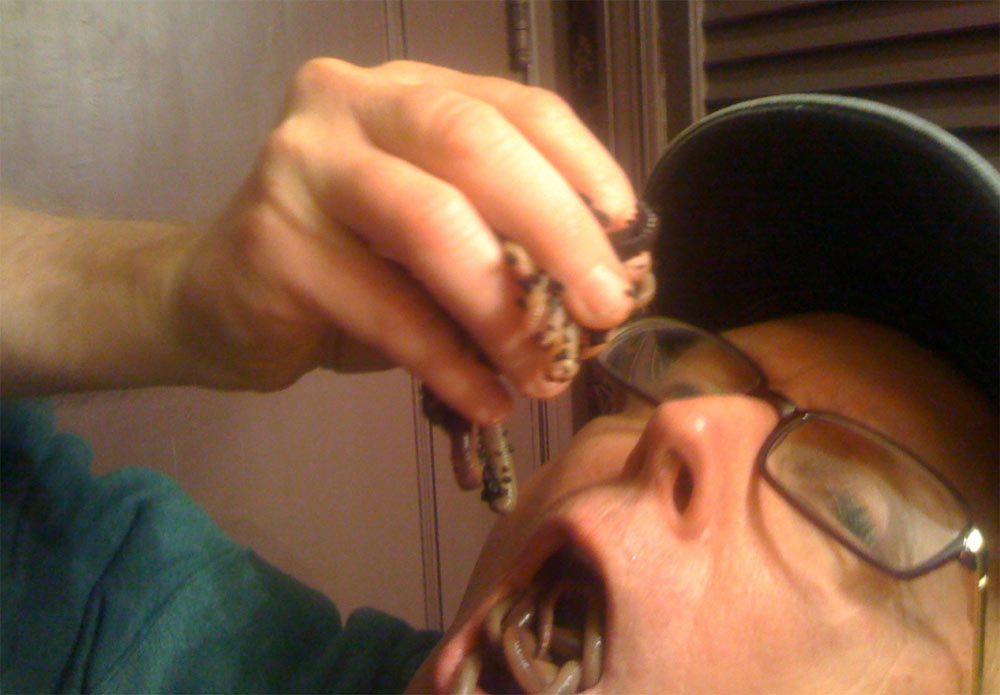Conservatives Are More Squeamish than Liberals

Most people would likely avert their eyes when passing by a man with a mouth full of writhing worms, or, say, the sight of a pile of excrement. But some are more disgusted than others, and new research suggests those individuals who respond with a more intense "yuck" are more likely to hold conservative political views and specifically are more likely to oppose same-sex marriage.
"This is one more piece of evidence that we, quite literally, have gut feelings about politics," said study researcher Kevin Smith, a political science professor at the University of Nebraska-Lincoln. "Our political attitudes and behaviors are reflected in our biology."
For instance, a study by Cornell University's David Pizarro and his colleagues found that those people who scored high on the so-called disgust sensitivity scale tended to hold more politically conservative views. The findings, reported in 2009 in the journal Cognition & Emotion, relied on participants' reported level of disgust linked to various scenarios.
And a 2008 study by scientists at the University of Nebraska-Lincoln (UNL) found that people who are highly responsive to threatening images were likely to support defense spending, capital punishment, patriotism and the Iraq War.
That's gross!
The new study takes this link a step further by looking for actual physiological evidence of disgust and whether the evidence is linked to political leaning.
For the study, Smith, UNL political scientist John Hibbing and their colleagues selected 50 individuals from a random sample in order to have an equal number of people who were politically right- and left-leaning, as well as those who avoided politics altogether. Participants had an average age of 41, split fairly evenly between males and females, and had an average annual income between $40,000 and $60,000.
Get the world’s most fascinating discoveries delivered straight to your inbox.
As the participants looked at a series of 38 images that ranged from pleasant to unpleasant, their skin conductance was measured, which is a gauge of the level of activation of the sympathetic nervous system, the part of the nervous system that activates the automatic "fight or flight" response in surprising situations.
Five of the images had been rated as "disgusting" by an independent group, and included: a man in the process of eating a mouthful of writhing worms; a horribly emaciated but alive body; human excrement floating in a toilet; a bloody wound; and an open sore with maggots in it. [Read: The 10 Most Diabolical and Disgusting Parasites]
The participants also answered questions to gauge their political views. The results showed, as predicted, that those who indicated conservative political views responded to the icky pictures with much more intense disgust than did liberals.
How to avoid disease
Why did the results show conservatives to be more squeamish?
Scientists think some level of disgust sensitivity is "normal," and helps us along with our human ancestors avoid disease. "The role of disgust in the avoidance of disease, one of the primary sources of mortality over the centuries, makes it essential to survival," the researchers write this month in the online journal PLoS ONE.
But what does this disease-avoidance system have to do with political views?
"I think that one plausible explanation is sort of along the lines that one way to understand some of these attitudes about politics and morality is that they have a strong emotional component," Pizarro told LiveScience in a telephone interview. Different emotions are linked with different kinds of judgments and behavior, he added. For instance, fear is linked to vigilance and preparedness, he said, while disgust is linked to steering clear of any sort of contamination, "foreign looking" things, or possibly even strange people.
As such, people who are more easily disgusted may be more likely to take on political views that help them avoid these "disgusting" situations.
"Sex, with its exchange of bodily fluids and all that can be viewed as disgusting," Hibbing told LiveScience in an email. "And this appears to be particularly true for homosexual sex [and] in fact this response is often described as the 'ick' factor. So the long-standing hypothesis that variations in disgust would be correlated with policy stances related to sexuality and homosexuality seems to follow naturally from this."
Follow LiveScience for the latest in science news and discoveries on Twitter @livescience and on Facebook.
Jeanna Bryner is managing editor of Scientific American. Previously she was editor in chief of Live Science and, prior to that, an editor at Scholastic's Science World magazine. Bryner has an English degree from Salisbury University, a master's degree in biogeochemistry and environmental sciences from the University of Maryland and a graduate science journalism degree from New York University. She has worked as a biologist in Florida, where she monitored wetlands and did field surveys for endangered species, including the gorgeous Florida Scrub Jay. She also received an ocean sciences journalism fellowship from the Woods Hole Oceanographic Institution. She is a firm believer that science is for everyone and that just about everything can be viewed through the lens of science.


